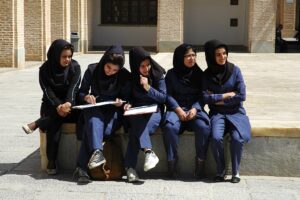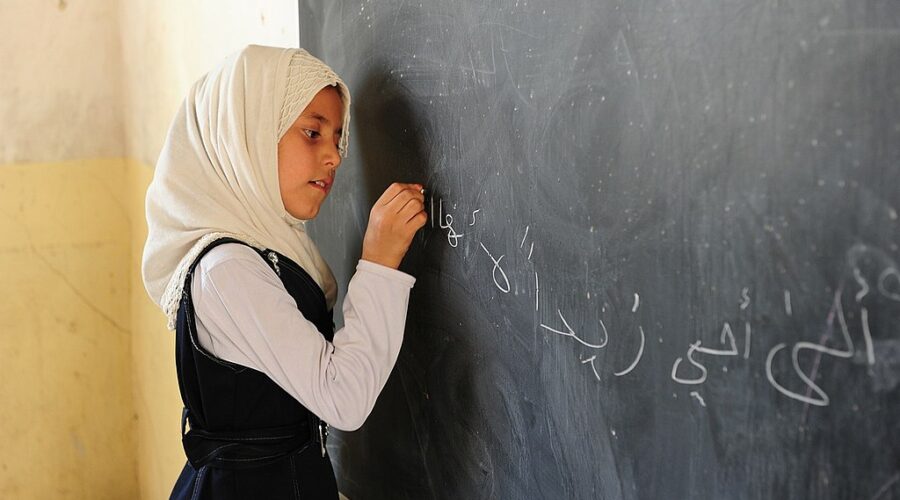These days, in different cities of Iran, there are women and girls without hijab – despite arrests and fines (from $10 to $70,000, depending on the judge) – in public places, such as schools and universities. There is also an increasing number of CCTV cameras to identify and arrest these people.
These show that the face of Iran has changed a lot after the death of Mahsa Amini.
What has worried many Iranian families for the last five months, surely not unrelated to the recent protests, is the serial poisoning of mostly schoolgirls. Chemical attacks have been reported on girls’ dormitories of universities and boys’ schools.
Although no clues have been found for the regime’s involvement in these chemical attacks, there are several factors in this field that suggest it could be playing a role in poisoning more than 6,000 schoolgirls across Iran, because the presence of teenage girls in the spread of protests was impressive.

These chemical attacks happened for the first time on November 30, 2022, in Noor Girls School in Qom, one of the most religious cities in Iran. Eight students were poisoned. The chemical attacks were carried out in the same school for a second time on December 13, 2022, but this time 51 students were hospitalized.
Gradually, these attacks spread to other cities such as Borujerd, Tehran, Sari, Neishabur, and more than 20 other cities. These students had similar symptoms, such as shortness of breath and muscle cramps, but apparently, the gas they inhaled was different. In some cases, the students said that it smelled like rotten eggs, and in some other cases, they considered it similar to the smell of tangerines. Some authorities of the Ministry of Education have considered these odors to be caused by carbon dioxide or carbon monoxide gases, but this is not certain.
The last attacks were on Tuesday, April 25, 2023, when two schools in Kermanshah, two schools in Sanandaj and one school in Tehran were targeted. Now, more than five months have passed since the attacks began, and the authorities of the Islamic Republic have not yet announced any reports about these attackers and have even blamed the students.
The first issue that is controversial is the large number of CCTV cameras around and even inside the schools. How is it possible that the cameras have not recorded anybody carrying out these attacks? Interestingly, these same cameras work well for recording women not wearing hijab!
While the number of poisoned students is increasing, news agencies such as Fars, affiliated with the IRGC, did not use the words poisoning or chemical attacks and instead described the students as “sick” or “not well”. It considered the students’ own indoctrination as a reason.
Fars news agency considers these poisonous gases to be the result of stink bombs that students use to tease each other and believes that the anti-Iranian media is exaggerating to make people worry. In response to reporters, Bahram Eynollahi, the Minister of Health and Medical Education, considers these poisonings to be the result of students’ anxiety and mischief and rejects the idea of chemical attacks.
The regime is not satisfied with this and has arrested journalists who publish articles in this field. Ali Portabatabaei is one of the investigative journalists who published articles on the Qomnews. This journalist has been in custody for several days now, and no news has been published about him. Hasti Amiri, Fereshte Tousi, and Saba Nabavi, students of Allameh Tabataba’i University, have also been accused of “propaganda against the government” for protesting these poisonings and telling people about them, and they will soon face trial.
Over the last five months, the Islamic Republic has not only tried to prevent the publication of news about chemical attacks, but also trivialized them. In some cities, such as Rasht, when students’ families gathered and protested, security police fired tear gas and beat them. In addition to wanting the perpetrators of the attacks to be identified, these families demanded that classes be held online so that they don’t have to worry about such incidents. The Ministry of Education refused their proposal.
Eventually, the Coordinating Council of Iranian Teachers’ Trade Associations (CCITTA) reacted to these events and issued a statement calling for the formation of committees to protect students against chemical attacks. This independent organization considers the targeted government attacks more than any other factor. The CCITTA warned that if the perpetrators of these attacks are not identified, tried and punished, teachers will inevitably hold classes in the streets to save the lives of students.
Images: Blue Sonic and Stefano Vigorelli

